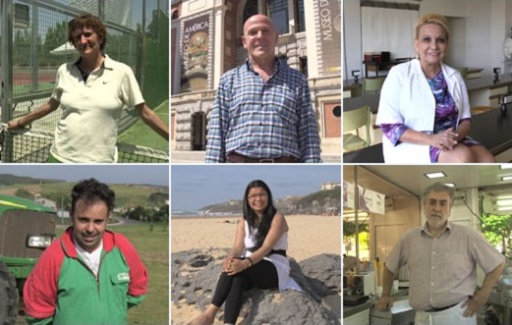2.1 Listening to introductions
In this section, you are going to practise listening out for people’s personal details by anticipating what people might say when introducing themselves.
Actividad 1
Before you watch a series of videos in the next activity, choose three aspects from the following list that you would mention to introduce yourself and write them down in the box.
- Edad
- Nacionalidad
- Lugar de origen
- Nombre
- Profesión
- Lugar de residencia
Answer
Any of these types of information could be used by someone providing basic information about themselves so in situations such as introductions to other people you need to get ready to listen to relevant language in those areas.
Actividad 2
Which expressions would you expect to hear when someone introduces themselves? Match the expressions with the different categories of information.
Ejemplo
Edad ➜ Tengo… años
Using the following two lists, match each numbered item with the correct letter.
-
Tengo… años
-
Soy…
-
Nací en…
-
Me llamo…
-
Trabajo de/en…
-
Vivo en…
a.Nacionalidad
b.Edad
c.Nombre
d.Lugar de origen
e.Profesión
f.Lugar de residencia
- 1 = b
- 2 = a
- 3 = d
- 4 = c
- 5 = e
- 6 = f
Feedback
Lugar de origen ➜ Nací en… (‘Soy de… ’ is another way to express origin)
Nombre ➜ Me llamo… (‘Mi nombre es…’ is another way to express your name)
Profesión ➜ Trabajo de/en… (‘Soy …’ is another way to express profession)
Actividad 3
Now listen to the six speakers in the video below, and complete the following table with the information they provide about themselves.

Transcript
| Nombre | Edad | Lugar de origen (país) | Lugar de residencia |
|---|---|---|---|
| Manuel Rivero | |||
| Paloma Zancajo | 50 años | ||
| Celia Sánchez Ramos | Zaragoza | ||
| Antonio Feal Dopico | |||
| Amalia Schubert Arévalo(s) | |||
| Andrés Ponga Colina |
Answer
| Nombre | Edad | Lugar de origen (país) | Lugar de residencia |
|---|---|---|---|
| Manuel Rivero | 55 años | Santander (en el norte de España) | |
| Paloma Zancajo | 50 años | Madrid | Madrid |
| Celia Sánchez Ramos | 56 años | Zaragoza (noroeste de España) | |
| Antonio Feal Dopico | 64 años | La Coruña (España) | |
| Amalia Schubert Arévalo(s) | 29 años | Santa Rosa del Aguaray | |
| Andrés Ponga Colina | 34 años | Santander, (capital de Cantabria | Ajo |
Box 1: Using context and visual clues to make predictions
Knowing aspects of the theme, the context or the speakers can help you predict the content of what you are going to listen to. For instance, while watching a movie you will be able to identify a situation where people greet or introduce each other so this social context will help you to listen out for and recognise some of the key words likely to come up in this context. Knowing that in such a situation you will most likely hear the names of people and specific places will help you to be alert and prepared for when that happens. At this stage the most important thing is that you are able to identify when these are expressed. As in your own language, you may not clearly capture those names, but you can recognise when they are said in the sentence. Predicting is about knowing when to expect them.
None of the people you heard talked about their occupation or nationality, and only some mentioned where they live. However, by looking at the surrounding background you could make a guess at where they live. The additional visual clues of how they are dressed also provide you with crucial contextual information about what they might do for a living and what they might be talking about in their introduction.

